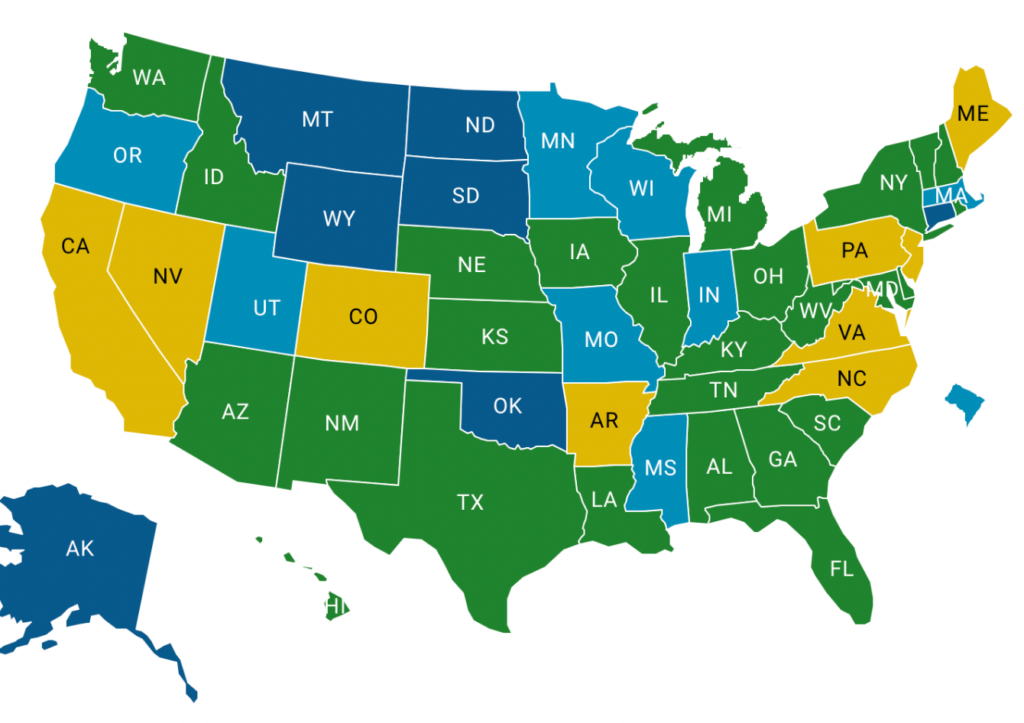This information was collected through a combination of state surveys and NASHP staff research. It offers a snapshot of how the state is defining, training, certifying, and paying for the CHW workforce — as well as how the state is developing cross-agency and state-to-local strategies to improve community health in partnership with CHWs.
This is a dynamic policy space, and states are continuing to develop new approaches. We will continue to make periodic updates to this page. Learn more about state CHW policies across the U.S.
State CHW Definition
The Wisconsin Department of Health Services website defines CHWs as “the bridge that connect people to care and resources to help them be healthy. CHWs are community members who have lived experience in overcoming barriers to access, navigating systems, and using resources in the communities they serve. The primary goal of a CHW is to improve health outcomes of people in their communities.”
Certification and Training
Wisconsin has several training programs available for CHWs interested in CHW core competency training (based on the C3 Project).
Wisconsin does not have a CHW certification. As part of the Wisconsin CHW Network, there are six CHW-led committees, including one that focuses on curriculum and training.
Medicaid Reimbursement
Medicaid health plans in Wisconsin can fund CHW care coordination work via non-administrative funds as of January 2017. Medicaid covers services provided by prenatal care coordination and peer support specialists, some of whom are CHWs. Two managed care organizations (Great Rivers HUB and UniteWI) have value-based payment arrangements with the Pathways Community HUBs.
Other Funding or Financing Mechanisms
Pathways Community HUB Model offers sustainable reimbursement mechanisms via value-based or outcome-based payments. Additionally, several CHW positions are supported through braided or matched funding through grants, community foundations, health systems, and health plans.
Key Partnerships
The Wisconsin CHW Network, Wisconsin Public Health Association CHW Section, UW-Madison MATCH, and Just Recovery for Racial Equity Initiative are key partners.
State CHW Legislation
Information is unavailable.
State Resources
State Overviews
ACO – Accountable care organization
AHEC – Area Health Education Centers
APHA – American Public Health Association
APM – Alternative payment model
CBO – Community-based organization
CDC – Centers for Disease Control and Prevention
CDC CCR Funding – Community Health Workers for COVID Response and Resilient Communities Funding
CHR – Community health representative
CHW – Community health worker
CPT Codes – Current Procedural Terminology Codes
C3 Project – CHW Core Competency Project
FFS – Fee for services
HCSPCS Codes – Healthcare Common Procedure Coding System Codes
HRSA – Health Resources & Services Administration
MCO – Managed care organization
NACHW – National Association of Community Health Workers
SDOH – Social determinants of health
VBP – Value-based payment
State CHW Definition: This category indicates where states have a formal definition of a CHW. In some cases, where there is not a definition in statute, this category may draw information from provider manuals and state websites or reports.
Certification and Training: This category includes information about how CHWs are trained in the state, which entities provide training, whether or not the state runs or recognizes a CHW certification program, and information about the entities that administer existing certification programs.
Medicaid Reimbursement: This category includes information about state Medicaid strategies that provide enrollees access to CHW services. Entries indicate whether state Medicaid programs currently reimburse for CHW services or incorporate CHWs into alternative payment models under the authority of a state plan amendment (SPA), or where states have earmarked funds to support CHW services under the authority of an 1115 demonstration waiver. It also indicates where CHW services might be supported through managed care approaches (e.g., where MCOs are paying for CHW services using administrative dollars or where states are using managed care contracts to incentivize or require MCOs to cover CHW services).
Other Funding or Financing Mechanisms: This category includes information about other state funding or financing approaches that cover CHW services or CHW positions. It includes information about federal grant dollars for which the state is the grantee.
Key Partnerships: This category offers information about key partners outside state government, including state CHW associations and CHW training entities, and highlights formal cross-agency partnerships within the state that support alignment of funding and resources for the CHW workforce.
State CHW Legislation: This category highlights any state legislation relevant to the CHW workforce. This might include statutory language directing agencies to develop a Medicaid reimbursement approach, laws that established state CHW certification, or other relevant statutes.
State Resources: This category offers links to any key reports or resources that states elected to highlight as critical to CHW policy and partnership.



